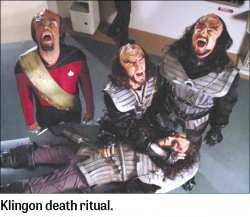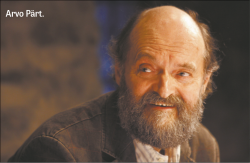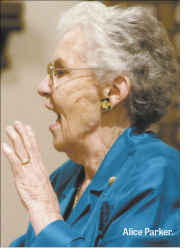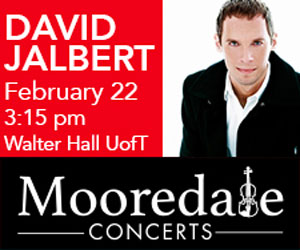In my last column before the summer I promised to address the reluctance of audiences to attend performances of new music, citing the extreme example of one determined listener who vetted a concert over the phone in order to make sure nothing on the program was too modern.
This is a problem not just for choral concerts, but for new music in general. The quantity of words committed to paper on this subject is responsible for the demise of several large forests. In brief, the two opposing stances are:
 1) Modern music feh. Why should I pay good money to hear something that sounds like a battalion of cats attacking a giant mutant chihuahua while a chorus of bull walruses sings the Nauruan national anthem backwards?
1) Modern music feh. Why should I pay good money to hear something that sounds like a battalion of cats attacking a giant mutant chihuahua while a chorus of bull walruses sings the Nauruan national anthem backwards?
2) Modern music is the future, this piece in particular is pure genius, and everyone in the concert hall gets it except you. What is your problem? Why can’t you get with the program? Go away and listen to Bach’s Minuet in G on auto-repeat. If you get bored, listen to a can-can by Offenbach or something.
Okay, it’s not always so bad, but it’s pretty darn close. Keeping it brief, let me see if I can both give a bit of historical context and offer a solution to the problem.
1) During the last century, classically trained composers wanted to innovate, like most artists do.
2) Some innovators composed music that sounded unpleasant — torturous, in fact — to many listeners. Never ask why this happened. Believe me, you don’t want to know. If you hear a composer start to talk about it, run away.
3) Some other innovators wrote music that wasn’t quite so scary, but it still was odd enough to spook those who were used to Mozart, Tchaikovsky, etc. This stuff sometimes had key signatures, but a lot of people still found it nauseating.
4) But nobody cared anyhow, because as it turned out, you didn’t have to listen to modern music anymore to be all cultured and superior. You could listen to the Beatles (rock), John Coltrane (jazz), or non-Western classical music (“exotic” instruments and timbres) and still feel like you were a cut above. A lot of this music was just as intricate as the new classical stuff but sounded way nicer.
5) Over time it became clear that nobody wanted to listen to the most difficult new music except weird people and snobs. The composers grew up and had children, but their kids weren’t weird snobs and they didn’t like it either. Most of them got into hip-hop, actually.
6) Eventually composers got tired of only being listened to by snobby weirdos, and started writing music again that non-musicians — that is, most normal people — could like and appreciate.
7) Now we have to convince everyone that new music isn’t as bizarre as the stuff their grandparents hated. A lot of it isn’t. Really! In fact it’s pretty tame. Composers want to be your friends. So will you please come back and listen?
Now, you may go to a concert in which nice pleasant classical music by dead guys is played, and then the stupid musicians will throw in some new stuff as well. Sorry about that — we kind of like to mix it up. Please don’t leave. You will upset the composers’ mums, ’cause they are all still alive and their feelings get hurt when you walk out or throw things at their sons and daughters. But don’t worry — if you happen to get stuck at a concert with totally discordant music, you have two sure-fire methods of recourse:
1) Before the concert, watch (on YouTube) the episode of Star Trek: TNG in which Lieutenant Worf listens to Klingon opera (“Unification II,” season 5, 1991). Then pretend Klingon opera is the music you’re going to hear. Be brave like Worf and listen to it.
2) Think of scary movies. Actually, think of any movie in which bad things happen. Listen (on YouTube) to Leonard Bernstein’s score for On the Waterfront (1954) and Bernard Herrmann’s score for Psycho (1960). Not so bad, right? Next time you’re at a new music concert, close your eyes and imagine that you’re being menaced by a lunatic or getting beat up by dockyard thugs. This will render the musical experience much more enjoyable.
I hope this solves the problem and encourages you to take a chance on the new stuff. If not, I’ll have no choice but to write about this subject again, but seriously this time. Trust me, you don’t want that. Now, on to the concerts.
 Estonian composer Arvo Pärt is an example of a composer whose work has depth, edge and substance, but has also found popular, mainstream appeal with many audiences — especially choral audiences, which can be quite a conservative bunch. Soundstreams Canada has long been a central champion of Pärt’s music in Canada, and their house choir, Choir 21, boasts some of the strongest choral singers in the region. This is a chance to hear this music masterfully executed.
Estonian composer Arvo Pärt is an example of a composer whose work has depth, edge and substance, but has also found popular, mainstream appeal with many audiences — especially choral audiences, which can be quite a conservative bunch. Soundstreams Canada has long been a central champion of Pärt’s music in Canada, and their house choir, Choir 21, boasts some of the strongest choral singers in the region. This is a chance to hear this music masterfully executed.
The concert on October 1 will include the Canadian premieres of two Pärt works, Adam’s Lament and L’abbe Agathon, and the world premieres of two Canadian works, James Rolfe’s Open Road, and a new commission (written for a very special reason which will be revealed at the concert) by young Canadian-Estonian composer Riho Maimets. I do not know his work, but I am familiar with Rolfe, and I can assure wary concert-goers that this will certainly be a moving and delightful concert. If you are new to modern choral works, this is an excellent chance to experience composers and musicians working at the top of their game. Guest conductor Tõnu Kaljuste is one of the world’s great choral musicians.
 Another notable choral visit takes place in October, but registration for the event is under way even as I write. American choral composer, arranger, author and conductor Alice Parker is coming for SING!, a three-day workshop and community songfest from October 25 to 27. Parker is a choral legend (now well into her ninth decade) who has devoted her life to choral music. During the weekend Parker will lead community singing, give a workshop on hymnody in worship, lecture at the University of Toronto, preach at Yorkminster Park Baptist Church and conduct a massed choir of over 200 singers in a grand finale concert. The gala finale will include a who’s who of Toronto choral groups: the University of Toronto MacMillan Singers, U of T Women’s Chamber Choir & Men’s Chorus, Exultate Chamber Singers, Orpheus Choir of Toronto, Cawthra Park Secondary School Chamber Choir and Yorkminister Park Baptist Church Choir.
Another notable choral visit takes place in October, but registration for the event is under way even as I write. American choral composer, arranger, author and conductor Alice Parker is coming for SING!, a three-day workshop and community songfest from October 25 to 27. Parker is a choral legend (now well into her ninth decade) who has devoted her life to choral music. During the weekend Parker will lead community singing, give a workshop on hymnody in worship, lecture at the University of Toronto, preach at Yorkminster Park Baptist Church and conduct a massed choir of over 200 singers in a grand finale concert. The gala finale will include a who’s who of Toronto choral groups: the University of Toronto MacMillan Singers, U of T Women’s Chamber Choir & Men’s Chorus, Exultate Chamber Singers, Orpheus Choir of Toronto, Cawthra Park Secondary School Chamber Choir and Yorkminister Park Baptist Church Choir.
The weekend’s events require no registration — this is an amazing opportunity for choral aficionados to watch or work with a master musician. The event is co-sponsored by Yorkminster Park Baptist Church, the Royal Canadian College of Organists and the Southern Ontario Chapter of the Hymn Society as well as by the University of Toronto Faculty of Music. For more info email the head of U of T’s choral program, hilary.apfelstadt@utoronto.ca.
Incidentally, Hilary Apfelstadt, as well as running choral activities at U of T, has further embraced Toronto’s choral culture by taking on the directorship of the Exultate Chamber Singers. One of Toronto’s top community choirs, established by John Tuttle (another choral legend), Exultate makes choral music at the highest level.
New music needs new singers and new energy, and there is always room for another choir in the city. This year choral fans can welcome the newly established Aslan Boys Choir and their artistic director Thomas Bell.
Targeted at boys aged 8 to 13, the choir’s mission statement is “to prepare boys for life and leadership through musical excellence and cultural enrichment.” Aslan is apparently still auditioning — if you have a child who enjoys choral singing, you can contact the choir at 416-859-7464 or aslanboyschoir@gmail.com to arrange an audition.
I would certainly encourage interested parties to find out more — chorus singing was a revelation to me at that age and opened up my awareness of both choral music and yes, modern composition.
I will be highlighting other modern works of the concert season in the months to come. A tip of the hat to west coast soprano Carolyn Sinclair for the Klingon opera solution to modern music. On with the show!
Benjamin Stein is a Toronto tenor and lutenist.
He can be contacted at choralscene@thewholenote.com.
Visit his website at benjaminstein.ca.



